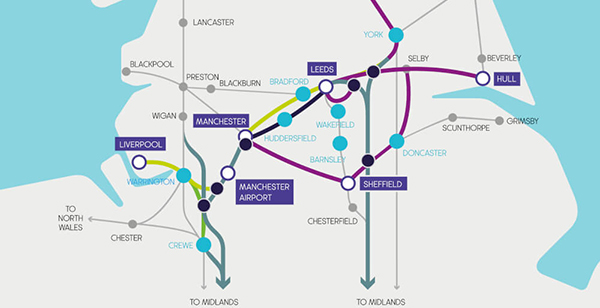What does the 2020 budget mean for the Northern regions?

How time flies; the “Northern Powerhouse” is already more than 5 years old. But have George Osborne’s plans to bring better connectivity, improve infrastructure and redress the balance between North and South achieved enough?
Last year’s report from the Institute for Public Policy Research(IPPR) finds progress has been made now that 47.1 per cent of the North is governed by a Mayor, 69.6 per cent of the North is now covered by a combined authority, and Transport for the North has brought forward a £70 billion investment package. This last point in particular looks like a major step in the right direction, but by this time we surely want to see concrete results and initiatives that truly change people’s lives, rather than any kind of bureaucratic fluff.
However, the Government itself cites a £13 billion of transport investment, the creation of 287,000 more jobs, and the total Northern economy growing by £10bn to £339 billion, which certainly sounds like progress. The IPPR does note several areas the Government aren’t so keen to mention themselves, including public sector employment falling by 37,000, transport spending in the South actually doubling the North when calculated per person, and jobs ceated by Foreign Direct Investment falling as well. The fact that the Northern regions are twice as vulnerable to the deleterious effects of Brexit in terms of employment, according to the IPPR, is a bitter irony, given voting habits in those regions.
There’s clearly work to be done, and new Chancellor Rishi Sunak’s 2020 budget is an opportunity for the Conservatives to reaffirm their commitment to building up the north of England. Admittedly, a certain global pandemic has taken precedence, but we can still ask – how did the north fair?
The Chancellor named a figure of £640 billion of gross capital investment will be provided for roads, railways, communications, schools, hospitals and power networks across the UK by 2024-25, and it’s good to see that a number of projects for the North fall under this.
Building on the Transforming Cities Fund, the government will invest £4.2 billion from 2022-23 for five-year funding settlements for eight Mayoral Combined Authorities in West Yorkshire, Greater Manchester, West Midlands, Liverpool City Region, Tyne and Wear, West of England, Sheffield City Region and Tees Valley.
Elected Mayors will be able to deliver the full benefits of devolution and put forward ambitious plans, such as the renewal of the Sheffield Supertram, the development of a modern, low-carbon metro network for West Yorkshire and tram-train pilots in Greater Manchester.
The Mayoral Combined Authority in West Yorkshire will provide £1.1 billion of investment for the area over 30 years, as well as devolving significant new decision-making powers on transport, planning and skills. It also underpins the agreement of a long-term intra-city transport settlement for the region starting in 2022-23.
The government is due to provide up to £500,000 to support Bradford’s regeneration and development plans to increase the benefits of potential Northern Powerhouse Rail connections.
In terms of transport for the North, here’s a quick breakdown:
- £198 million for the North East, including £95 million for frequency and reliability improvements across the Tyne and Wear Metro system and to complement the government’s recent £337 million investment in new rolling stock.
- £40 million for Preston City Region, including £25 million for a new station at Cottam Parkway on the Preston-Blackpool line
- £166 million for Sheffield City Region, including a new Bus Rapid Transit link in Barnsley and a new tram stop on the Tram-Train line to Rotherham at Magna
- £317 million for West Yorkshire, including £39.9 million for Halifax delivering a new bus station, improved rail station and other improvements to complement the revitalisation of the town centre and £30 million for active and sustainable travel across Bradford
It’s important to note that only the Manchester to Leeds leg of the Northern Powerhouse Rail scheme has been officially reaffirmed. Many people, will be expecting the rest to follow.

Importantly for the areas of Teesside, Humberside and Merseyside, the Government plans to spend at least £800m to establish two or more carbon capture and storage clusters by 2030, creating up to 6,000 high-skilled, high-wage jobs.
This all sounds very positive, and it is, but these announcements ought to be the start of things to come.
There are areas that were missing from the Chancellor’s announcement which would benefit from investment and create greater unity within the Northern Powerhouse as a whole. A commitment to the full extent of the proposed Northern Powerhouse Rail, as well as greater investment in towns, is paramount to the flourishing of the North.
All in all, there has been progress and there is more to come. The process of reducing the North/South divide is a long one, and the full delivery of the Northern Powerhouse is bound to take many years. The Conservatives must be held to their word in Northern investment.
For the property sector, that means prices and rental rates in key northern cities will grow as economies boom and jobs are created. Regions in Northern England are expected to see the best house price growth in the UK over the next five years, and with much infrastructure work underway, now is the time for property investors to get involved.
Aspen Woolf is a leading property consultancy, focused on presenting the best performing investment opportunities to our clients. We search across the UK to find high growth, high yielding investments, and our particular strength in northern England represents the quality of investment that can be found in the growing cities of Liverpool, Leeds and Manchester.
Have a look at what we have to offer:


